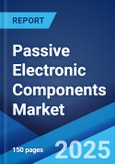Passive electronic components refer to electrical parts that do not generate power and are incapable of power gain. They consist of capacitors, resistors, transformers, inductors and coils. They are manufactured using tantalum, ceramic, aluminum electrolytic, paper and plastic films. Passive electronic components absorb energy and do not require electrical power to operate. They are commonly used in various electronic devices, such as computers, home appliances, smartphones and gaming consoles. They are reliable, easy to design, cost-effective and can easily handle large voltage currents and power without the requirement of a power supply and amplifying elements. As a result, passive electronic components are widely used across medical, automotive, aerospace, energy, telecommunications, defense, and data storage industries.
Passive Electronic Components Market Trends:
Significant growth in the automotive industry across the globe is creating a positive outlook for the market. Passive electronic components are widely used in specialized and high-performing components, such as emergency brake assistance systems and infotainment. In line with this, the increasing demand for electric vehicles (EVs) due to environmental and emission concerns is favoring the market growth. Additionally, various new product innovations, such as the introduction of wire wound and metal oxide high-power resistors that assists in monitoring circuits and diagnosing and testing sensors, are providing an impetus to the market growth. Furthermore, the growing miniaturization of passive electrical components that can easily be used in consumer electronics, such as smartphones, cameras and speakers, is positively impacting the market growth. Apart from this, the widespread product utilization in medical devices integrated with sensors to collect data about patients, extensive research and development (RD&D) activities and the introduction of various shapes and geometries of inductors are anticipated to drive the market toward growth.Key Market Segmentation:
The publisher provides an analysis of the key trends in each sub-segment of the global passive electronic components market report, along with forecasts at the global, regional and country level from 2023-2028. Our report has categorized the market based on type and end use industry.Breakup by Type:
- Capacitor
- Ceramic Capacitors
- Tantalum Capacitors
- Aluminum Electrolytic Capacitors
- Paper and Plastic Film Capacitors
- Supercapacitors
- Inductor
- Power
- Frequency
- Resistor
- Surface-mounted Chips
- Network
- Wirewound
- Film/Oxide/Foil
- Carbon
Breakup by End Use Industry:
- Aerospace and Defense
- Consumer Electronics
- Information Technology
- Automotive
- Industrial
- Others
Breakup by Region:
- North America
- United States
- Canada
- Asia-Pacific
- China
- Japan
- India
- South Korea
- Australia
- Indonesia
- Others
- Europe
- Germany
- France
- United Kingdom
- Italy
- Spain
- Russia
- Others
- Latin America
- Brazil
- Mexico
- Others
- Middle East and Africa
Competitive Landscape:
The competitive landscape of the industry has also been examined along with the profiles of the key players being Eaton Corporation PLC, KOA Corporation, Kyocera Corporation, Murata Manufacturing Co. Ltd., Panasonic Corporation, Samsung Electro-Mechanics Co. Ltd., Taiyo Yuden Co. Ltd., TDK Corporation, TE Connectivity, TT Electronics Plc, Vishay Intertechnology Inc. and Yageo Corporation.Key Questions Answered in This Report
1. What was the size of the global passive electronic components market in 2022?2. What is the expected growth rate of the global passive electronic components market during 2023-2028?
3. What are the key factors driving the global passive electronic components market?
4. What has been the impact of COVID-19 on the global passive electronic components market?
5. What is the breakup of the global passive electronic components market based on the type?
6. What is the breakup of the global passive electronic components market based on the end use industry?
7. What are the key regions in the global passive electronic components market?
8. Who are the key players/companies in the global passive electronic components market?
Table of Contents
Companies Mentioned
- Eaton Corporation PLC
- KOA Corporation
- Kyocera Corporation
- Murata Manufacturing Co. Ltd.
- Panasonic Corporation
- Samsung Electro-Mechanics Co. Ltd.
- Taiyo Yuden Co. Ltd.
- TDK Corporation
- TE Connectivity
- TT Electronics Plc
- Vishay Intertechnology Inc.
- Yageo Corporation
Methodology

LOADING...
Table Information
| Report Attribute | Details |
|---|---|
| No. of Pages | 138 |
| Published | July 2023 |
| Forecast Period | 2022 - 2028 |
| Estimated Market Value ( USD | $ 36.6 Billion |
| Forecasted Market Value ( USD | $ 49.3 Billion |
| Compound Annual Growth Rate | 5.1% |
| Regions Covered | Global |
| No. of Companies Mentioned | 12 |









